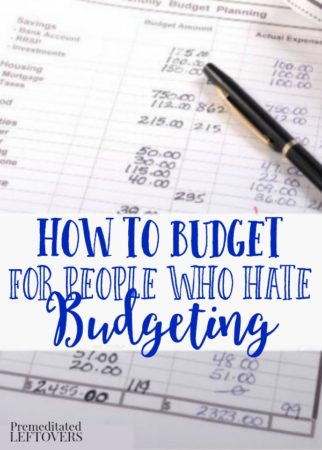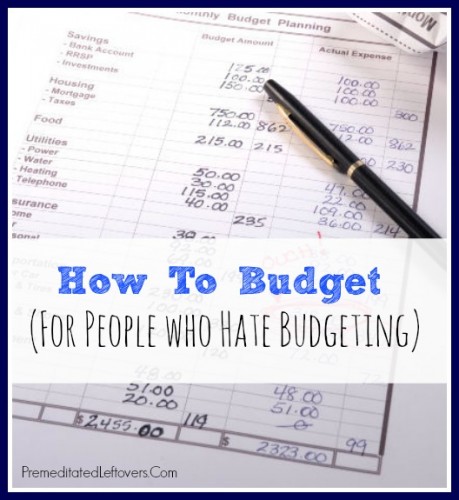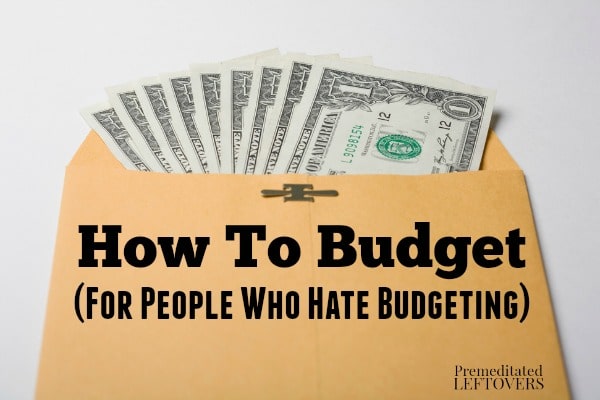Do you hate creating a budget? Here are some tips on how to budget that will help you create a budget that works for you.
Budgeting a great way to manage your money, but if you are like many people, the idea of doing it is something you dread and may not be something you even want to start because you worry it will take too much of your time or you may just not know how to do it effectively. Here are some tips for people who hate budgeting.
How to Budget (For People Who Hate Budgeting)
Make budgeting as simple as possible. Use tools such as a Budget Planner or Quicken to understand your budget and make it easier to see what is going in and out of your home financially. If your budget is simplified, you will probably find it a whole lot easier to do, especially when it is available on your computer in just a few clicks.
Use more broad categories when budgeting. You don’t have to micro-manage everything. You can simply put your most frequent expenses into broad categories such as food, mortgage/rent/utilities, automobile, entertainment, and savings. Being a little less specific allows you to simplify things by placing them into general categories, so it is much easier to stick with.
Make a budget you will actually stick with. If you get overly complicated in your planning, you will most likely not stick with it, so be honest with yourself when you start to create a plan for budgeting. If a portion of your budget is not something you know you will honestly stick with, find a better way.
Get all the boring details done first. To create a budget, you need to know where your money is going. For a month or two, don’t actively budget. Instead, just watch where your money is going carefully and make notes on it. Be completely honest. If you stop and buy a candy bar and soda at the gas station, jot it down. At the end of the month, look through your notes. Where is your money going? What category does this spending fit into? Where could you spend less? In order to create an effective budget, you need to know this.
Make saving easy. For many people, automatic saving is the easiest way to do that portion of their budget. If you get your paycheck direct deposited, ask your bank to add a portion of it every paycheck, to a savings account as soon as it is deposited. That way, you don’t even have to think about saving as it is done automatically for you.
Give yourself an allowance to stop mindless spending. If you don’t do much of anything else with your budget, this is a biggie you should. Giving yourself a weekly spending budget and only carrying that money with you in cash form will stop you from just spending willy-nilly and will greatly improve your chances of being able to stick with your budget at home by forcing you to live within your means.
Try envelope budgeting. This is where you get your paycheck in cash and then stick specific amounts in paper envelopes labeled with bills, savings, food, etc. When it comes time to spend, you have it all organized without much thought.
Don’t deprive yourself. If one of the reasons you don’t want to budget is you worry you will have to live bare bones, then don’t do it. Make sure to leave yourself a specific amount each paycheck for entertainment, fun shopping and dining out. The idea is to control your money, but not leave you unhappy and feeling deprived.
Do you hate to budget? What are some roadblocks that make it hard to budget for you? I would love to hear all about it in the comments!
More Budgeting Tips
How to Stop Living Paycheck to Paycheck
10 Tips for Staying on a Budget






Kitty says
I’m also living in WA state.I’m trying to do a budget for I don’t know how many years, but I never follow it. Now that my husband bought a house I’m trying to do a budget again but is hard and difficult to do it. I don’t know where to start. Any suggestions? Thanks, Kitty
Amy says
Thank you. I love my envelope system! I budget out in the beginning of the month and when the cash is gone, it’s gone. As purchases are made I tuck the receipt in it’s corresponding envelope. I am so much more aware of not only how much but exactly where my money goes.